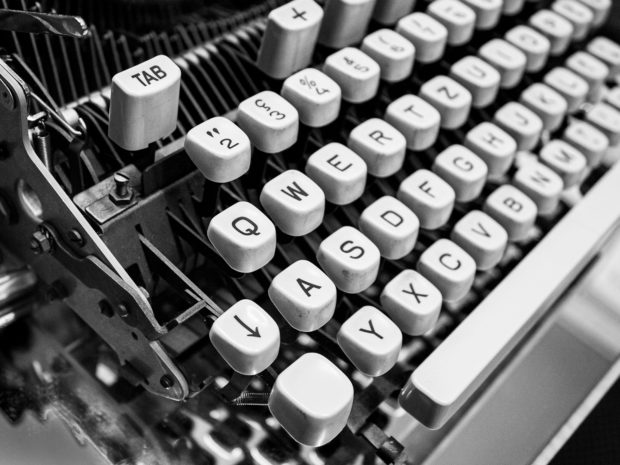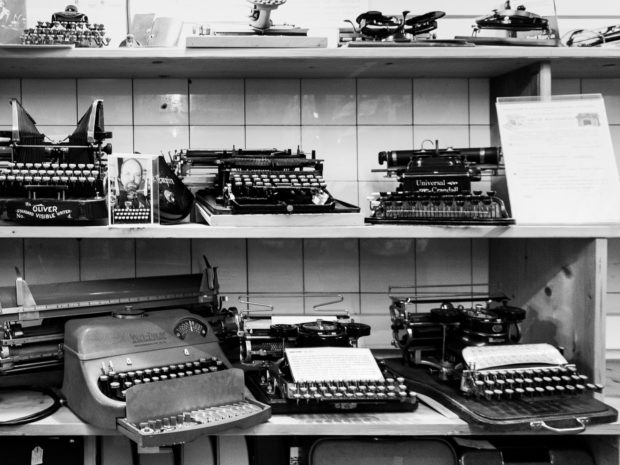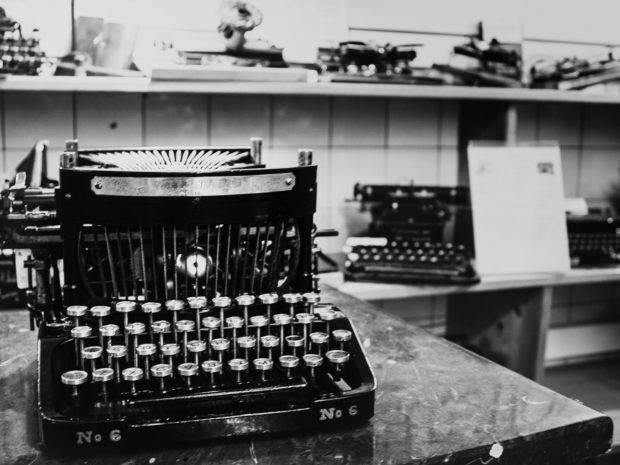You have no items in your cart. Want to get some nice things?
Go shopping
On top of the small mirrored table set out for special exhibits, a vintage Hermes 3000 typewriter still rattles from the blow. Museum owner and director Jacques Perrier has just smashed his palm down on the mint green keyboard, and the dozen or so tarnished keys that converged on the paper are now clumped together and stuck. He has seen children do this, he explains, extracting each typebar from the jam, but it’s the cackling of the parents he has never understood.
We are halfway through the tour of the Lausanne Typewriter Museum, which is only minutes from the city’s main attraction, the Olympic Museum – by any other measure, a lot further than that. In place of state-of-the-art installations designed to evoke fist-pumping or tears, the Typewriter Museum documents history with little drama, or in any case less. Once Jacques has restored order to the Hermes, he attempts a second, more composed response to my question about the NE PAS TOUCHER SVP sign on a nearby shelf. “The sign is meant for the people who don’t know how to touch a typewriter,” he says, leaving the obvious caveat, about their growing numbers, unsaid.

There was a time the collection looked forward, when Jacques’ father was building up the typewriter repair business he would eventually hand over, just before the personal computer took off. Jacques adapted, turning to electronics, and today fixes computer printers in the workshop across the parking lot. But every so often, a request draws on his roots – usually for an appraisal of someone’s estate, though once for some on-set coaching on a big-budget movie that cast a nostalgic eye on the world he still inhabits. A few years back, a hotel concierge in Montreux even called in a rush job for a guest whose name he couldn’t disclose. After Jacques applied a bit of gentle pressure, the driver who was sent with the broken machine assured him that Jack Sparrow, wink-wink, would be ever so grateful.
For the most part, the typewriters that cross Jacques’ hands are housed where we are right now: in the basement of a low-rise building at the end of a treeless cul-de-sac. There is enough room for a few hundred gems, along with clusters of adding machines, hole punchers and other widgets of the mid-20th-century office. Space, time and funds permitting, Jacques could imagine a permanent exhibition tracking office life through the decades. Some of these objects, after all, did more than punch holes. Did I know, for example, how important the typewriter was to the rise of women in the workplace? I think of pencil skirts and grabby hands, and suspect I’ve been told a different story.
A number of shelves are packed with Hermes, the Swiss manufacturer known for its mechanical precision (“A country of watchmakers,” Jacques says, with a shrug). The purported list of fans includes Hemingway, Steinbeck, Kerouac, Ionesco, Frisch and Plath, with the 3000 and Baby models stirring up the most affection. Swiss artist and musician Dieter Meier, of Yello fame, even penned an ode, Hermes Baby: Confessions of a Fetishist. I discover this only at home, but get a hint of the fervor when Jacques grabs the first Hermes in reach to show off its innards.
In and around the talk of daisy wheels and ribbon spools, my own memories dislodge. It’s easy to recall the snap of the keys and the grinding carriage, less so the physical force and conviction once needed to commit words to print. Jacques points out that the very first, so-called invisible models didn’t let the typist see the paper until it was removed. The inability to review, let alone edit, work in progress is unthinkable. In some kind of displaced panic, I later buy the last two packs of Tipp-Ex correction sheets in the workshop.
I save the most scorn for the index typewriter, launched in the 1880s as a portable alternative to the (now) classic keyboard models. Through a point-and-select mechanism that conjures up a clunky GPS scrolling knob, the device allows for one-handed typing, one painstaking character at a time. “Ah,” Jacques interjects, tilting his head, “but that’s society’s problem. Back then, the day started when the sun rose and ended when it set. ‘Fast’ didn’t matter if it made clean letters and it worked.”
The philosophical asides break up the technical interludes and, like the visit itself, come free. To supplement the collection box, the museum has hosted type-a-thons, concerts and, implausibly, the odd fondue night. Once, Jacques invited Paul Auster to the museum after meeting him at a reading, but at the last minute the famous typewriter fan fell ill and had to cancel. At least he’ll always have those few minutes of conversation and, of course, the signed book. Still, he wonders. Maybe if he had tried harder, he could have hosted Auster – could have met Jack Sparrow. “I’m not so good at playing the game,” he concludes, his activist t-shirt peeking out from beneath his work coat.
When we get to the international section, I stand over the 1939 German model and almost miss the “SS” symbol above the 5. How prim and insidious it looks: a machine used to destroy, not create. By the time we get to the Greek, Arabic and Korean typewriters, and the Braille writers, Robotypers and stenotypes, I could use some air.

Jacques yanks the paper out of the Hermes 3000 and starts imitating some of the younger visitors trying to reinsert it. He shoves a corner into the type basket, scratches his chin and then places the sheet on top of the carriage. The biggest laugh comes when he covers the keyboard like a blanket – because it’s slapstick and funny, and also a little bit lonely, being one of the few people left who know how.
Lausanne Typewriter Museum (Musée de la machine à écrire), by appointment only

About D.B. Miller
D.B. Miller’s short fiction, creative nonfiction and offbeat profiles appear in FlashFlood 2023, Ellipsis Zine, Bending Genres, Idle Ink, Litro, Reflex Fiction, Split Lip Magazine, Offshoots, NBHAP and Stanchion Zine (2024). follow her on dbmillerwriter.com or Twitter (@DBMillerWriter) and Instagram (@dbmwr
- Web |
- More Posts(2)



2 comments